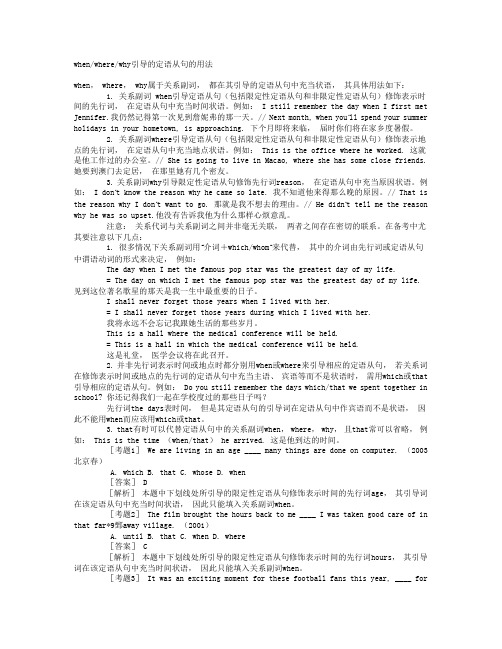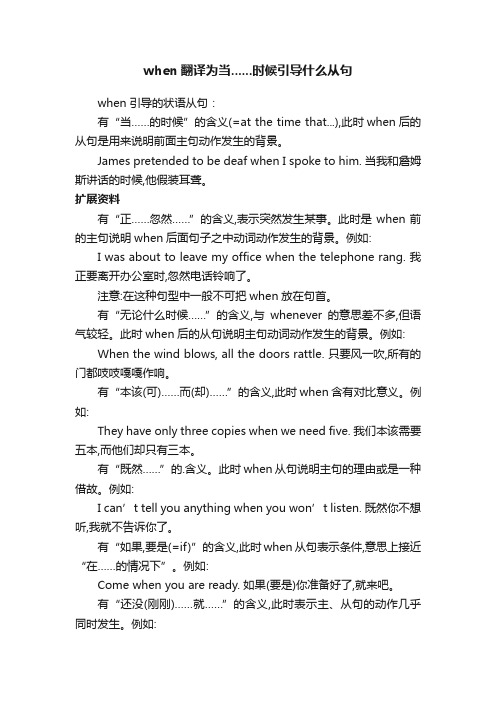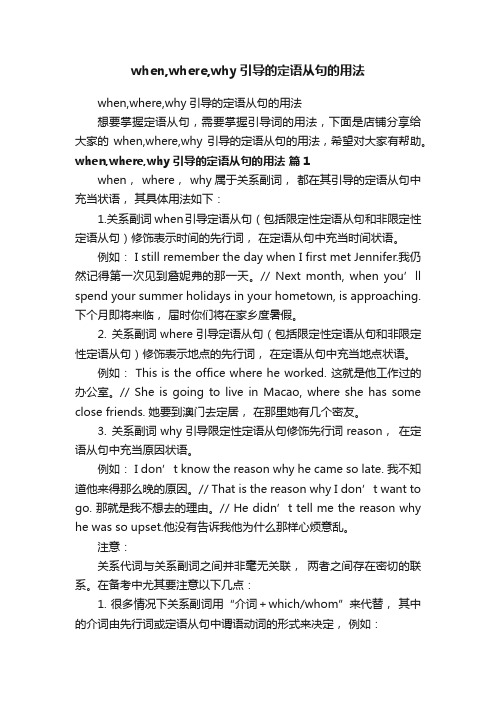when-引导的从句用法一
when引导的定语从句的用法

when/where/why引导的定语从句的用法when, where, why属于关系副词,都在其引导的定语从句中充当状语,其具体用法如下:1. 关系副词 when引导定语从句(包括限定性定语从句和非限定性定语从句)修饰表示时间的先行词,在定语从句中充当时间状语。
例如: I still remember the day when I first met Jennifer.我仍然记得第一次见到詹妮弗的那一天。
// Next month, when you’ll spend your summer holidays in your hometown, is approaching. 下个月即将来临,届时你们将在家乡度暑假。
2. 关系副词where引导定语从句(包括限定性定语从句和非限定性定语从句)修饰表示地点的先行词,在定语从句中充当地点状语。
例如: This is the office where he worked. 这就是他工作过的办公室。
// She is going to live in Macao, where she has some close friends. 她要到澳门去定居,在那里她有几个密友。
3. 关系副词why引导限定性定语从句修饰先行词reason,在定语从句中充当原因状语。
例如: I don’t know the reason why he came so late. 我不知道他来得那么晚的原因。
// That is the reason why I don’t want to go. 那就是我不想去的理由。
// He didn’t tell me the reason why he was so upset.他没有告诉我他为什么那样心烦意乱。
注意:关系代词与关系副词之间并非毫无关联,两者之间存在密切的联系。
在备考中尤其要注意以下几点:1. 很多情况下关系副词用“介词+which/whom”来代替,其中的介词由先行词或定语从句中谓语动词的形式来决定,例如:The day when I met the famous pop star was the greatest day of my life.= The day on which I met the famous pop star was the greatest day of my life.见到这位著名歌星的那天是我一生中最重要的日子。
when 用法

when 用法"when" 是一个常用的副词和连词,用于引导一个时间、条件或原因从句,或用于询问时间、条件或原因。
以下是"when" 的一些详细用法:1. 引导时间从句:- "I will call you when I arrive home."(当我到家时,我会给你打电话。
)- "He was sleeping when the phone rang."(电话响时,他正在睡觉。
)2. 引导条件从句:- "I will go to the park when it stops raining."(当雨停下来时,我会去公园。
)- "She will start studying when she finishes her dinner."(当她吃完晚饭时,她会开始学习。
)3. 引导原因从句:- "He was late for the meeting when his car broke down."(当他的车抛锚时,他迟到了会议。
)- "She couldn't sleep when she had a lot on her mind."(当她有很多事情在心头时,她无法入睡。
)4. 用作连词表示同时发生的两个动作:- "I was reading a book when the doorbell rang."(当门铃响时,我正在看书。
)- "She was cooking dinner when her friend called."(当她的朋友打电话时,她正在做晚饭。
)5. 引导疑问句询问时间、条件或原因:- "When did you arrive?"(你什么时候到的?)- "When will they start the project?"(他们什么时候开始这个项目?)- "When can we meet again?"(我们什么时候可以再次见面?)总的来说,"when" 用于引导时间、条件和原因从句,用于描述同时发生的动作,或用于询问时间、条件和原因。
when引导定语从句

when引导定语从句When作为连词,可以引导名词从句、定语从句和时间状语从句。
下面是店铺整理的when引导定语从句,欢迎大家阅读参考,希望帮助到你。
定语从句引导词 whenwhen作为定语从句的引导词时,表示时间,在从句中充当时间状语,后面需要加上完整的陈述语序。
句式如下:表示时间的名词+when+完整陈述句+句子其它成分。
when引导的定语从句可以放在主语,宾语或者表语,甚至为名词的宾补之后。
例:The night when we took a stroll in the park was so cold.咱们在公园散步的那个晚上好冷。
night 做主语,被定语从句when we took a stroll in the park 修饰。
I remember the night when we took a stroll in the park.我记得那个咱们一起在公园散步的夜晚。
night变成了宾语,被定语从句when we took a stroll in the park修饰。
What I can never forget is the night when we took a stroll in the park.我永不能忘记的是咱们一起在公园散步的那个夜晚。
night变成了表语,被定语从句when we took a stroll in the park修饰。
以上三组例句中,when后面所接的都是完整句,并且when 后的从句时态和主句一致。
前提是when充当的从句的时间状语,相当于是at the night.所以,以上三句,可以把when都改成at which。
when引导的定语从句和时间状语从句的区别第一,修饰关系不同。
若when引导定语从句,when前面必然有表示时间的名词,即先行词;若when引导时间状语从句,则其前面没有表示时间的名词,这是因为when引导的时间状语从句是用来修饰动词,表示动作或状态发生的时间。
when翻译为当......时候引导什么从句

when翻译为当......时候引导什么从句when引导的状语从句:有“当……的时候”的含义(=at the time that...),此时when后的从句是用来说明前面主句动作发生的背景。
James pretended to be deaf when I spoke to him. 当我和詹姆斯讲话的时候,他假装耳聋。
扩展资料有“正……忽然……”的含义,表示突然发生某事。
此时是when前的主句说明when后面句子之中动词动作发生的背景。
例如:I was about to leave my office when the telephone rang. 我正要离开办公室时,忽然电话铃响了。
注意:在这种句型中一般不可把when放在句首。
有“无论什么时候……”的含义,与whenever的意思差不多,但语气较轻。
此时when后的从句说明主句动词动作发生的背景。
例如: When the wind blows, all the doors rattle. 只要风一吹,所有的门都吱吱嘎嘎作响。
有“本该(可)……而(却)……”的含义,此时when含有对比意义。
例如:They have only three copies when we need five. 我们本该需要五本,而他们却只有三本。
有“既然……”的.含义。
此时when从句说明主句的理由或是一种借故。
例如:I can’t tell you anything when you won’t listen. 既然你不想听,我就不告诉你了。
有“如果,要是(=if)”的含义,此时when从句表示条件,意思上接近“在……的情况下”。
例如:Come when you are ready. 如果(要是)你准备好了,就来吧。
有“还没(刚刚)……就……”的含义,此时表示主、从句的动作几乎同时发生。
例如:I had hardly opened the door when he hit me. 我刚开门,他就打我。
when-的用法

when 的用法一、when 用作副词。
1。
用作疑问副词,引导特殊疑问句。
(什么时候,何时[at what time ])例如:①When will you come to see me?②When are they going to visit the Great Wall?2。
用作连接副词,通常用来引导名词性从句[主语从句、表语从句、同位语从句、宾语从句]及起名词作用的“ when +动词不定式”结构。
(什么时候,何时[at which;on which ])例如:①When he comes is not known。
[主语从句]②The morning is when I am busiest. [表语从句]④I don't know when the plane takes off。
[宾语从句]⑤I don’t know when to leave for London。
[宾语]3. 用作关系副词,引导限定性定语从句和非限定性定语从句。
(在…的时候[at/on/in/during which])例如:①Do you still remember the days when we stayed in America?②The day will come soon when the Chinese astronauts will go to the moon。
③It happened ten years ago,when I was a child.④We will go to the countryside at the beginning of June,when the summer harvest will start.二. when 用作连词。
1。
用作从属连词,意为“当……的时候[at the time when ]”,引导时间状语从句。
例如:①They learned a lot from the peasants when they stayed in the village。
when,where,why引导的定语从句的用法

when,where,why引导的定语从句的用法when,where,why引导的定语从句的用法想要掌握定语从句,需要掌握引导词的用法,下面是店铺分享给大家的when,where,why引导的定语从句的用法,希望对大家有帮助。
when,where,why引导的定语从句的用法篇1when, where, why属于关系副词,都在其引导的定语从句中充当状语,其具体用法如下:1.关系副词 when引导定语从句(包括限定性定语从句和非限定性定语从句)修饰表示时间的先行词,在定语从句中充当时间状语。
例如: I still remember the day when I first met Jennifer.我仍然记得第一次见到詹妮弗的那一天。
// Next month, when you’ll spend your summer holidays in your hometown, is approaching. 下个月即将来临,届时你们将在家乡度暑假。
2. 关系副词where引导定语从句(包括限定性定语从句和非限定性定语从句)修饰表示地点的先行词,在定语从句中充当地点状语。
例如: This is the office where he worked. 这就是他工作过的办公室。
// She is going to live in Macao, where she has some close friends. 她要到澳门去定居,在那里她有几个密友。
3. 关系副词why引导限定性定语从句修饰先行词reason,在定语从句中充当原因状语。
例如: I don’t know the reason why he came so late. 我不知道他来得那么晚的原因。
// That is the reason why I don’t want to go. 那就是我不想去的理由。
// He didn’t tell me the reason why he was so upset.他没有告诉我他为什么那样心烦意乱。
when引导时间状语从句
when引导的时间状语从句
when意为“当……的时候”、“在……时候”,引导时间状语从句,表示主句的动作和从句的动作同时或先后发生。
例句:
When she is on holiday, she always goes sailing.
When I was wandering in the street,I met her.
when从句可在主句后,或主句前;在主句前时,要用逗号。
2)when引导的时间状语从句中的动词可以用延续性的=动词,也可以用终止性动词
例句:
He was listening to the music when I went in.
We will stop when you do.
3)表示事情发生在同个时间段
例句:
They went skiing when they were on vacation.
4)表示从句动作完成之后,紧接着发生其动作
When the bell rang, Tom went out of the classroom.
注:时间状语从句在表示将来之时,常用一般现在时表将来
例句:I will go to bed when my father comes home.
While与when有时候意思相近,因此when有时候可替换while 例如:
You called me when (while) I was out.。
when句型的用法总结
when句型的用法总结一、when 句型的基本用法1. 定义和介绍When 是一个连词,引导时间状语从句。
它表示某个动作或状态发生的具体时间。
2. 当句子表示“当…时”,“每当…”等含义时,我们可以使用 when 来引导时间状语从句。
例如:- When I was young, I used to play soccer every day.(我小时候,每天都踢足球。
)- When it rains, I like to stay at home and read books.(下雨的时候,我喜欢呆在家里读书。
)3. 当主句和时间状语从句表示将来的情况时,我们通常使用一般现在时代替将来时。
例如:- We'll go swimming when she arrives tomorrow.(她明天到达后,我们会去游泳。
)- He will take a vacation when he finishes his project next month.(他下个月完成项目后会休假。
)4. time words 或者频率词类正是应用 when 句型中的好帮手。
这些time words包括:before(在...之前)、after(之后)、as soon as(一...就)、until/till(直到、至到)和while等。
这些频率词类还包括:always(总是), usually(通常), often(经常), sometimes(有时候), rarely(很少), never(从未)等。
5. 引导时间状语从句的其它连词在 when 句型中,还有其他可以引导时间状语从句的连词,如 while(当...期间)、as(正当...时候)和 before(在...之前)。
这些连词也可以根据具体的语境来选择使用。
二、when 句型的高级应用1. 定义和介绍When 句型除了上述基本用法之外,还拥有更多复杂的表达方式,使得句子更具丰富性、准确性。
when 引导的从句用法一
when 引导得从句用法一、引导时间状语从句1、表示”当……得时候",相当于atthe moment when、例如:When wegottothecinema, the filmhad been onfor half an hour。
当我们到达电影院时,电影已放映半小时了。
She was writing a letter when I came in。
当我进来时,她在写信。
2、表示"一……就……",相当于as soon as。
例如: The students got upwhen the bell rang、铃声一响,学生们就起床了。
I'llringyou up whenI arrivein Beijing。
我一到北京就给您打电话、3. 表示"就在这时;当时”,相当于justatthe moment或just then 、例如:Wewere about to startout whenit began to rainheavily. 我们正要启程,就在这时,天下起了大雨。
He had justreturned fromone business trip when he wasasked to make anoth er one.她刚刚出差回来,这时,又叫她再次出差。
4. 表示”每当;每次",相当于every time或whenever。
例如: She always turns to usfor help whenshe isin trouble、每当她遇到困难,她总就是向我们求助。
It is freezing coldhere wh enit snows. 每当这儿下雪,天气就十分寒冷、5。
表示"当……之后;在……以后",相当于after thetimethat。
例如: Wewent home whenthe film was over、电影结束以后,我们回家去了、When shegot home, shestarted toprepare supper。
when引导的句子前后时态
when引导的句子前后时态
when引导时间状语从句:表示有规律的,都用一般现在时;表示将来的事情,用主将从现;表示过去两个有先后的动作,都用过去式;表示一个动作正在进行(过去进行时),另一个动作插入(过去式)。
扩展资料
when引导的从句用什么时态
如果是宾语从句,那么时态问题就参考宾语从句的做法.
如果是时间状语从句,则基本有4种:
1.表示有规律的,都用一般现在时
如:Water turns into steam when we heat it.
2.表示将来的事情,用主将从现(主句将来时,从句一般现在时)
如:I will tell him when he comes back.
3.表示过去两个有先后的动作,都用过去式
如:When he came back, I told him the news.
4.表示一个动作正在进行(过去进行时),另一个动作插入(过去式)
如:I met my teacher when i was walking in the street.。
- 1、下载文档前请自行甄别文档内容的完整性,平台不提供额外的编辑、内容补充、找答案等附加服务。
- 2、"仅部分预览"的文档,不可在线预览部分如存在完整性等问题,可反馈申请退款(可完整预览的文档不适用该条件!)。
- 3、如文档侵犯您的权益,请联系客服反馈,我们会尽快为您处理(人工客服工作时间:9:00-18:30)。
when 引导的从句用法一、引导时间状语从句1. 表示"当……的时候",相当于at the moment when。
例如:When we got to the cinema, the film had been on for half an hour. 当我们到达电影院时,电影已放映半小时了。
She was writing a letter when I came in. 当我进来时,她在写信。
2. 表示"一……就……",相当于as soon as。
例如: The students got up when the bell rang. 铃声一响,学生们就起床了。
I'll ring you up when I arrive in Beijing. 我一到北京就给你打电话。
3. 表示"就在这时;当时",相当于just at the moment或just then .例如: We were about to start out when it began to rain heavily. 我们正要启程,就在这时,天下起了大雨。
He had just returned from one business trip when he was asked to make another one. 他刚刚出差回来,这时,又叫他再次出差。
4. 表示"每当;每次",相当于every time或whenever。
例如: She always turns to us for help when she is in trouble.每当她遇到困难,她总是向我们求助。
It is freezing cold here when it snows. 每当这儿下雪,天气就十分寒冷。
5. 表示"当……之后;在……以后",相当于after the time that。
例如: We went home when the film was over. 电影结束以后,我们回家去了。
When she got home, she started to prepare supper. 她回到家后,开始准备晚饭。
二、引导条件状语从句when引导的条件状语从句相当于if/ in case引导的条件状语从句.例如:When there is no gravity, our feet can no longer stay on the ground. 如果没有重力,我们的脚就不能够在地面上站稳。
Turn off the switch when anything goes wrong with the machine. 如果机器发生故障,就把电闸关上。
三、引导原因状语从句 when引导原因状语从句时,相当于since/now that引导的原因状语从句。
例如: How can they learn anything when they spend all their spare time watching television? 他们把所有的空闲时间都用来看电视了,还能学到什么东西呢? Why do you want a new job when you have got such a good one? 既然你已经有了这么好的一份工作,为什么还要再找新的工作呢?四、引导让步状语从句 when引导的让步状语从句相当于though或although引导的让步状语从句。
例如: He usually walks when he might ride. 虽然有车可乘,但他通常是步行。
The little girl can tell right from wrong when she is only twelve. 这个小女孩虽然只有十二岁,却能分清是非。
五、引导定语从句when引导定语从句时,有时可用in which或on which来替代。
例如: We'll put off the picnic until next week, when the weather may be better. 我们要把野餐推迟到下周,那时可能天气好些。
I'll never forget the day when I joined the Party. 我将永远不会忘记我入党的那一天。
六、引导名词性从句 1. 引导宾语从句。
例如: Please tell us when his father will return from abroad. 请告诉我们他父亲什么时候从国外回来。
2. 引导主语从句。
例如: When they will leave for Australia hasn't been decided. 他们什么时候动身去澳大利亚还没有决定。
3. 引导表语从句。
例如: The question is when they will get so much money to set up the factory. 问题是他们将在什么时候弄到这么多钱来把这个工厂办起来。
when, while 和 as 引导时间状语从句的用法这三个词的意思很简单,都有“当……时候”的意思。
但学生经常会问三个词的区别在哪儿,特别是在做选择题的时候。
别说是学生,就我个人而言,做这样的选择题要保证百分之百的正确也是不可能的。
现根据大量的实例和个人的思考,做一点小结,供大家参考。
一、when 的用法如果只从现象来看,when 从句用的最多的是一般过去时,而主句的时态没有限制,根据具体情况而定1. When he was a child he was always trying out new ideas. 他小时候就常常试验一些新的设想。
2. When she came into my room, I was just reading a book. 她走进我房间时,我正在看书。
3. Were you writing when the teacher came in? 老师进来的时候,你在写信吗?4. Sorry, I was out when you called me. 对不起,你打电话来的时候我出去了。
5. He was on the point of leaving when someone knocked at the door. 他正要走,这时有人敲门。
6. I thought of it just when you opened your mouth. 就在你要说话的时候,我也想到了。
7. I had hardly[scarcely] closed my eyes when someone knocked at the door.我刚一闭上眼,就有人在敲门了。
根据以上的例句,我们可以总结出一点:when 从句的A事件,相当于另一个事件B发生的时间点。
也就是说,when 从句的重点不在动作本身发生的状态,而只是把它作为一个时间点,所以when 多数情况下用的是一般过去时,则不用正在进行时。
因为如果用正在进行时,它表示的就是一段时间而不是一个时间点了。
根据这一点,有的文章补充说:when 从句的动词大多是瞬时动词。
这种说法也可以参照。
实际上,when 从句也可以有其它的时态,但几乎也不用进行时,因为它也只是作为一个时间参照点。
例如:1. When I got to the airport, the guests had left. 当我赶到飞机场时,客人们已经离开了。
2. When he had finished his homework, he took a short rest.当他完成作业后,他休息了一会儿。
3. Why do you want a new job when you have got such a good one already?你已经找到如此好的工作,为何还想再找新的?4. You shall borrow the book when I have finished reading it.在我读完这本书后,你可以借阅。
5. When the manager comes here for a visit next week, I’ll talk with him about this.下周,经理来这参观时,我会和他谈谈此事。
二、while 的用法相比于when 来说,while 从句的侧重点就不一样了。
while 从句的侧重点在于描述动作正在发生的状态,它的意思是:当while 事件正在发生的时候,另一件事如何如何。
所以,while 从句一般用的是正在进行时。
而另一件事的状态没有硬性的要求,根据具体情况而定。
例如:1. While my wife was reading the newspaper, I was watching TV.当妻子正在看报纸的时候,我正在看电视。
2. While Jim was mending his bike, Lin Tao came to see him.正当吉姆修自行车时,林涛来看他。
3. While they were talking, the bell rang. 正在他们谈话的时候,上课铃响了。
4. You can’t do your homework while you’re watching TV.你不能一边看电视一边做家庭作业。
5. While John was sitting biting his nails, I was working out a plan to get us home.约翰坐在那里咬指甲时,我正在制定一个回家的计划。
从时间的角度来看,while 表示的是一段时间,是一个过程。
这是while 的侧重点。
因此,如果含有“一段时间”的含义的时候,就可以用while。
6. Strike while the iron is hot. 趁热打铁。
这句话中,是说趁着铁是热的这段时间,赶紧打铁。
如果换成 when 意思就变了,相当于说铁只热了一下,打一下,然后铁就冷了。
这显然不符合文意。
—I'm going to the post office.—While you're there, can you get me some stamps?三、as 的用法as 从句表示的也是一件事情正在发生,另一件事也正在进行当中。
但与 while 从句不同的是,as 从句用的一般不用正在进行时,而只是一般过去时。
